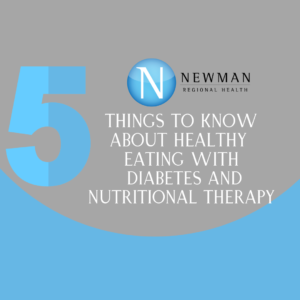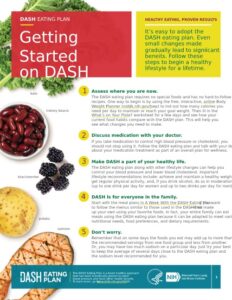Medical Nutrition Therapy
Newman Regional Health offers medical nutrition therapy for people with a medical diagnosis such as diabetes, high cholesterol, high blood pressure, obesity, or a specific nutritional need.

MNT is a nutrition-based treatment for various health conditions, both temporary and long-term. It involves a registered dietitian (RD) or registered dietitian nutritionist (RDN) creating a personalized nutrition plan. The plan may include dietary changes, supplements, or specialized nutrition delivery methods like IV (parenteral) or tube feeding (enteral). MNT is used to manage existing conditions and sometimes to prevent them or avoid the need for medication.
Conditions Managed with MNT
- Chronic kidney disease (CKD)
- Chronic obstructive pulmonary disease (COPD)
- Digestive system disorders (celiac disease, Crohn’s disease, IBS, ulcerative colitis)
- Diabetes (Type 1, Type 2, and gestational) and prediabetes
- Heart failure
- High blood pressure
- High cholesterol, high triglycerides, and dyslipidemia
- Malnutrition (including in cancer patients)
- Overweight and obesity
FAQs about Medical Nutrition Therapy
How to get started with Medical Nutrition Therapy
Start your journey to better health by talking with your primary care doctor, who can provide a referral. Don’t have a primary provider yet? Choose one today and begin personalized care.
Related News & Health Articles
Five Things to Know about Diabetes and Nutritional Therapy
By Lindsey Morin Even if you do not have diabetes, the chances of you knowing someone who does is high.…
The DASH Eating Plan as Part of a Heart-Healthy Lifestyle
The DASH eating plan requires no special foods and has no hard-to follow recipes. DASH menus allow you to plan…
Choose Heart-Healthy Foods
Heart-healthy eating involves choosing certain foods, such as fruits and vegetables, while limiting others, such as saturated and trans fats and added…



